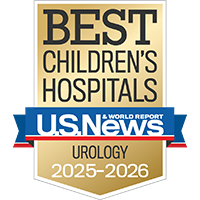Saving future lives
500+ UCSF investigators are researching cures for hundreds of childhood and adult diseases.


The testicle has attachments that hold it in place in the scrotum. Occasionally, these attachments do not exist and the testicle can twist. When the testicle twists on itself it causes the blood supply to kink and the testis does not receive the oxygen it needs to live.
Testicular torsion occurs mainly in two different age groups: 1. In newborns around the time of birth. 2. In adolescents, usually between 12-18 years of age.
Newborns typically do not have pain. Torsion is identified in newborns because the scrotum is discolored (appears bruised) or firm.
Adolescents usually have severe pain in the testicle that may cause nausea and vomiting. The adolescent will have a swollen scrotum and the testis may be higher up in the scrotum compared with the other testicle.
Torsion is diagnosed by a combination of symptoms, physical exam, and ultrasound. Ultrasound of the testicle can be done to check if the testicle is getting blood. If no blood flow is seen in the testicle this is consistent with torsion.
Torsion in the newborn typically does not require intervention. This is because the testicle is usually already not alive when it is found on exam.
Torsion in the adolescent requires immediate surgery. The testicle may survive if it is untwisted. The likelihood for survival is better the faster the torsion is fixed. Ideally, the testicle should be untwisted with surgery within 4 hours of the onset of symptoms. The longer the amount of time waited the more likely the testicle will not survive. The unaffected testicle on the other side is also tacked into place in the scrotum at the time of surgery in order to prevent it from twisting in the future.
If the testicle does not survive the child should not have any problems going through puberty or having children later in life because only one testicle is needed for this. If the child desires, there is an option to place a testicular prosthesis in the scrotum around the time of or after puberty.
UCSF Benioff Children's Hospitals medical specialists have reviewed this information. It is for educational purposes only and is not intended to replace the advice of your child's doctor or other health care provider. We encourage you to discuss any questions or concerns you may have with your child's provider.

Best in Northern California for urology

Ranked among the nation's best in 11 specialties
Saving future lives
